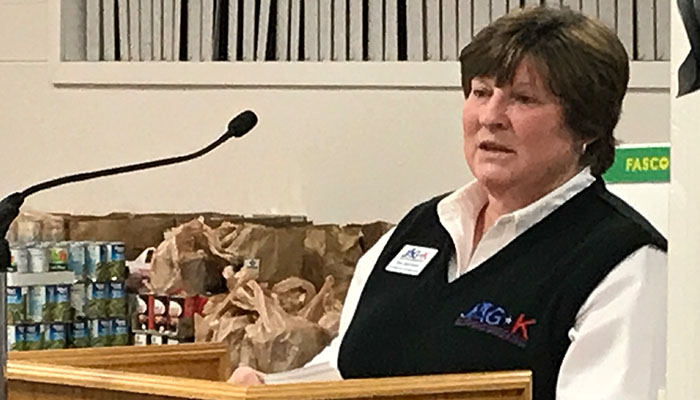
Hays Post
The Hays USD 489 school board heard a report on the Jobs for America’s Graduates-Kansas — a program to help at-risk students — at its meeting Monday.
The program, known as JAG-K, puts career specialists in schools to work with students.
The program helps students with remediation to help them graduate high school, works on career planning, and enhances leadership and job skills. Students visit workplaces and colleges, participate in a career association club and perform 10 hours of community service.
They have individual development plans. In these plans, they set goals and pair them with their academic work. These plans are going to be required for all students under the state’s new accreditation program.
Through the national and state associations, students participate in conferences and competitions associated with leadership, public speaking and math.
The program has a 97 percent graduation rate for 2017. Hays High School has about an 87 percent graduation rate. New state accreditation standards have set a goal of a graduation rate of 95 percent.
JAG-K students are enrolled in classes of 10 to 15 students during the school year, but the JAG-K specialists maintain contact with the students during the summer and for 12 months after graduation. About 35 to 50 students would be enrolled in the program initially at Hays High.
The goal of the program is not only to help students graduate, but also to obtain full-time employment, enter the military or go on to post-secondary education after high school. The program has an 89 percent success rate in students entering full-time employment, military or post-secondary education after high school. Post-secondary education or certification is another goal of the state’s new accreditation program.
Beverly Mortimer, JAG-K vice president of program development, used to be a superintendent in Concordia. She said she shook many students’ hands at graduation and sent them on their way, but she did not know where the students ended up after high school. Did they show up at college? Vocational school? The JAG-K program tracks the students and supports them in their career paths after high school.
If JAG-K students don’t graduate, the program works with them during the next year to earn their diplomas.
The program is funded by a TANF grant from the Department of Children and Families. The cost of the program is $65,000. One year of participation in JAG-K for the Hays school district would cost $6,500. The school district only has to provide a classroom and transportation. The JAG-K specialist is employed by the JAG-K program. Mortimer said the program tries to keep the cost and work associated with the program at a minimum for school districts.
Whereas most programs define students as at-risk because they receive free or reduced-cost lunches, JAG-K has a greater list of barriers it looks at to select students. The program selects students who have at least five barriers on a list of challenges. Some of these include children in foster care, students who have at least one parent who did not finish high school, students who have a parent who is incarcerated, students who have a parent who is unemployed, English language learners or students who live in single-parent home.
“When we talk about barriers, it is not just academics,” Mortimer said. “I wish I had with me a whole bunch of JAG-K kids from other schools to tell you their stories because all of these statistics are statistics. But if kids stand in front of you and tell you their stories of success and how they have overcome adversity and the resilience they have applied and been successful, it means a lot more than those statistics.
“We have a young man who is headed right now to Emporia State University. He got a 35 on his ACT. You are probably going, ‘What is his barrier? Why is he in your class?’ If you could see his family, you would know what his barriers are. They are low economics. I picked him up to take him to the airport for our national student leadership academy. He was a math participant. He said, ‘I think we are safe Miss Bev, but sometimes there are shootings in my neighborhood. My uncle was killed.’ It is just a matter of fact. That is his life.”
This student’s grades are very low, but he is an extremely intelligent young man, Mortimer said. He takes care of his four siblings, one of whom has cerebral palsy, and he has a full-time job while going to school. Mortimer said she has hundreds of stories like this student’s.
JAG-K is a national program with 68 programs in 33 school districts in the state of Kansas. Some other cities with JAG-K in Kansas include Salina, Great Bend, Junction City, Concordia, Atchison, Lawrence, Kansas City, Pittsburg, Arkansas City, El Dorado, Augusta and Coffeyville.
If the school district approves an agreement with the JAG-K, it would begin at Hays High School this fall. The agreement is for one year, so if district officials feel it is not effective, the program can be terminated at the end of the 2018-19 school year. The board has until April 1 to decide if it wishes to participate in the program for the upcoming school year.
Mortimer said JAG-K reached out to Hays because it recently received an increase in funding and is trying to reach more students. The program has no schools in northwest Kansas.
More information on the program can be found at www.jagkansas.org.
